| Joseph Hilaire Pierre René Belloc (27 July 1870 – 16 July 1953) |
|
Gilbert Keith Chesterton (29 May 1874 – 14 June 1936) |
|
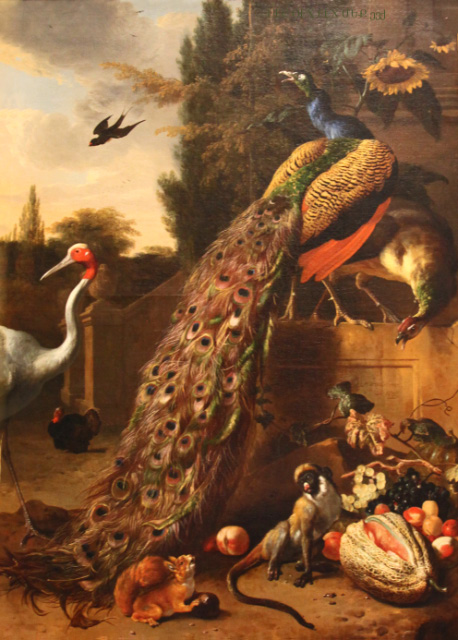
Peacocks (1683) d'Hondecoeter |
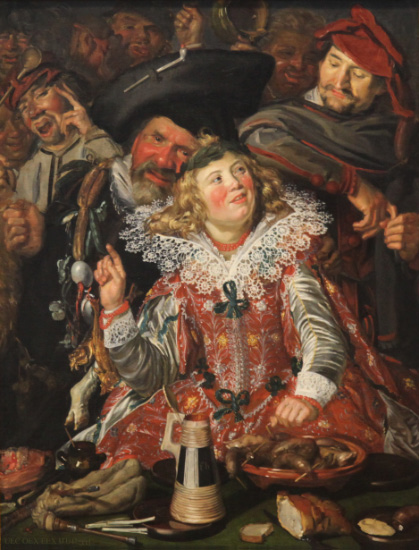
Merrymakers at Shrovetide (c. 1615) Frans Hals
|
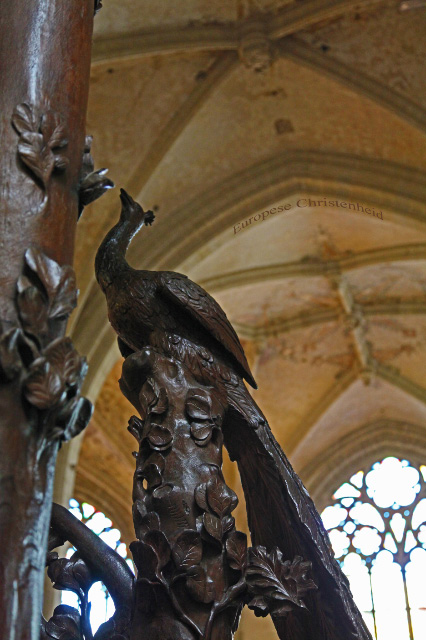
... detail from the Catholic Cathedral of Our Lady in Antwerp |
| |
|
|
| ...their times, a bit of orientation: |
|
|
|
| |
|
|
|
| |
|
|
|
The vote of the French parliament to declare
War on the German Kingdom of Prussia, initiating
La guerre franco-allemande – the Franco-Prussian War
– Das Deutsch-Französischer Krieg
(19 July 1870 – 10 May 1871) |
16 July 1870 |
|
|
Promulgation by the First Vatican Council of
Pastor Aeternus and its Definition
On the infallible teaching authority of the Roman Pontiff |
18 July 1870 |
} a rather busy couple of months which included the birth of Old Thunder
|
|
| The loss by the Pope of the Papal States, the sovereign lands over which the Popes were absolute monarchs, with interruptions, from the Donation of Pepin in the year 754 and the Codification of his son Charlemagne in 781, through the Capture of Rome by the forces of Italian unification, the Risorgimento, on XX Settembre – 20 September 1870 |
XX Settembre – 20 September 1870 |
|
|
| |
|
|
|
| |
|
|
|
| Nikolai Onufriyevich Lossky |
6 December [O.S. 24 November] 1870 – 24 January 1965 |
|
|
| Nikolai Alexandrovich Berdyaev |
18 March [O.S. 6 March] 1874 – 24 March 1948 |
|
|
| John Davison Rockefeller, Jr. |
29 January 1874 – 11 May 1960 |
|
|
| Vladimir Ilyich Ulyanov, a.k.a., Lenin |
22 April 1870 – 21 January 1924 |
|
|
| Alexei Maximovich Peshkov, a.k.a., Maxim Gorky |
28 March 1868 – 18 June 1936 |
|
|
| William Jennings Bryan |
19 March 1860 – 26 July 1925 |
(through stupidity facilitated, with his 1896 Cross of Gold speech, the co-opting, then destruction, by the Democrat Party of the Texas Farmers' Alliance and nascent populist movement, viable alternatives to usury, Communist or Capitalist) |
|
| Herbert Clark Hoover |
10 August 1874 – 20 October 1964 |
|
|
| Konrad Adenauer |
5 January 1876 – 19 April 1967 |
|
|
Ioseb Besarionis Dze Jugashvili, a.k.a., Iosif Vissarionovich Stalin |
18 December(NS) 1878 – 5 March 1953 |
|
|
Abdulaziz ibn Abdul Rahman ibn Faisal ibn Turki ibn Abdullah ibn Muhammad al-Saud
–the first King of the Wahhabi-Sunni Muslim Kingdom of Saudi Arabia, the only country in the world where it is illegal and a capital offence to build a Church, so of course the House of Saud is the close ally, dear friends of all the leaders of The West. There are many more than one million, mostly Catholic, Christians, in this country of thirty million. They are the actual workers. Bibles and any Christian devotional object are illegal. Abdulaziz was the father of many children, including 45 sons, and among these all six of his successor kings (Sa'ud, Faisal, Khalid, Fahad, Abdullah and the current Salman) of his kingdom, though this is easier to accomplish when one has 24 known wives, and probably others. If there were no God ( ! There Is ! ), this family man would be one of the all time winners among humankind. Oil discovered only in 1938, family "net worth" in 2018, perhaps 15 Trillion US$. |
|
15 January 1876 – 9 November 1953 |
|
|
| |
|
|
|
| Nikola Tesla |
10 July 1856 – 7 January 1943 |
|
|
| Thomas Alva Edison |
11 February 1847 – 18 October 1931 |
|
|
| David Llewelyn Wark "D. W." Griffith |
22 January 1875 – 23 July 1948 |
|
|
| Pablo Ruiz y Picasso |
25 October 1881 – 8 April 1973 (like von Mises) |
|
|
| G. K. , well OK, George Kennedy Allen Bell |
4 February 1883 – 3 October 1958 |
|
|
| |
|
|
|
| |
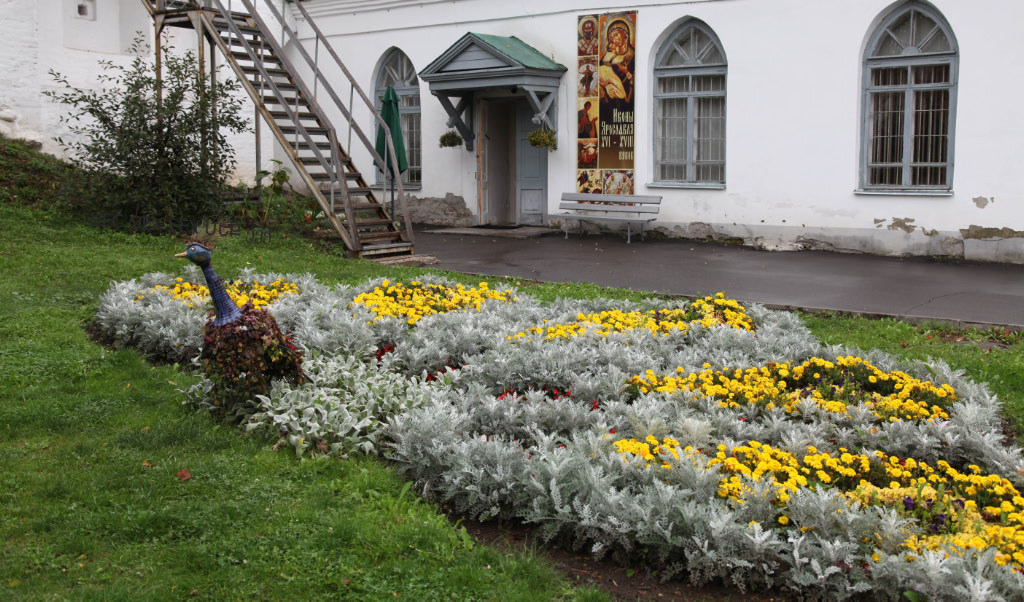 |
| |
|
in Holy Transfiguration Monastery, Yaroslavl - Спасо-Преображенский монастырь Ярославль |
| ... and a bit more of their times: |
|
|
|
|
| |
|
|
|
|
| Nikolai Alexandrovich Romanov, a.k.a., Nicholas II |
18 May (NS) 1868 – 17 July 1918 |
|
|
|
| Grigori Yefimovich Rasputin |
21 January (NS) 1869 – 30 December (NS) 1916 |
|
|
|
| |
|
|
|
|
| William Lyon Mackenzie King |
17 December 1874 – 22 July 1950 |
|
|
|
| |
|
|
|
|
| |
|
|
|
|
| Nathan Mayer von Rothschild |
1777 – 1836 |
|
Oh wait no, that was a century earlier. |
|
| Arnold Rothstein |
1882 – 1928 |
|
the American organized (street) crime leader; no Hollywood, he was not Italian-Catholic |
|
| Henry Goldman |
1857 – 1937 |
} |
res ipsa loquitur |
|
| Samuel Sachs |
1851 – 1935 |
|
| Julius Rosenwald |
1862 – 1932 |
|
Sears, Roebuck and Company and the NAACP |
|
| Joel Spingarn |
1875 – 1939 |
|
Columbia University and the NAACP |
|
| Chaim Azriel Weizmann |
1874 – 1952 |
|
Zionist leader through years of WWII and first President of State of Israel |
|
| Jacob H. Schiff |
1847 – 1920 (OK, a generation older) |
|
Banker (in today's money, Billionaire); chief Bolshevik financier and enabler, NAACP sponsor |
|
| Rabbi Stephen Samuel Wise (Weisz) |
1874 – 1949 |
|
NAACP founder |
|
| |
|
|
|
|
| Sigismund, a.k.a. Sigmund, Schlomo Freud |
1856 – 1939 |
|
|
|
| Lev Davidovich Bronshtein, a.k.a., Trotsky |
1879 – 1940 |
|
|
|
| Yakov Mikhailovich Sverdlov |
1885 – 1919 |
|
|
|
| Yakov Mikhailovich Yurovsky |
1878 – 1938 |
|
|
|
Ovsey Gershon Aronovich Radomyslsky,
mother's surname and his sometime alias Apfelbaum,
a.k.a, Grigory Yevseevich Zinoviev |
1883 – 1936 |
|
|
|
| Lev Borisovich Rozenfeld, a.k.a., Kamenev |
1883 – 1936 |
} |
and this list could be expanded enormously, but nope, no pattern to be found here.
It must be the writings of Friedrich Nietzsche, and the Nazi's embrace of the same (? Nazis embraced the "anti-anti-Semite" Friedrich Nietzsche ?) which were the chief underlying cause
of the second phase of the Great Civil War of European Christendom, WWII.
And Margaret Sanger must be the progenitrix of abortion in America, Marie Stopes in the U.K. Whatever you do, "Chestertonian" idolaters, never mention Paul R. Ehrlich in connection with Eugenics, and never, ever mention even the word Jew. You would endanger your chief real concerns: |
|
| |
|
|
remaining relevant, remaining remunerated.
|
|
Nikolai Ivanovich Yezhov, a.k.a., the malignant dwarf
and author of the eponymous 1937-1938 Ежовщина – Yezhovshchina, the most murderous phase of the Great Terror – Большой Террор |
1 May 1895 – 4 February 1940 |
|
|
|
Yenokh Gershevich Iyeguda,
a.k.a., Genrikh Grigoryevich Yagoda |
7 November 1891 – 15 March 1938 |
|
|
|
| Kurt Eisner |
14. Mai 1867 – 21. Februar 1919 |
|
|
|
| Rosa Luxemburg |
5. März 1871 – 15. Januar 1919 |
|
|
|
| Béla Kun |
1886. február 20. – 1938. augusztus 29 |
|
|
|
| Arnold Schoenberg (actually Schönberg) |
13 September 1874 – 13 July 1951 |
|
Atonal leader of the movement to degenerate music. |
|
| Nadezhda Krupskaya |
26 февраля 1869 – 27 февраля 1939 |
|
|
|
| Emma Goldman |
27 June 1869 – 14 May1940 |
|
|
|
| |
|
|
|
|
Smedley Darlington Butler, "the Fighting Quaker"
Major General, United States Marine Corps (the then highest rank); One of 14 men in history to be awarded the Medal of Honor for extreme heroism in two different actions. From the 1930s a populist and staunch critic of war profiteering and military adventurism; foe of plutocrats; author of War is a Racket (1935). |
30 July 1881 – 21 June 1940 |
|
|
|
| |
|
|
|
|
| Anton Pavlovich Chekhov |
29 (NS) January 1860 – 15 (NS) July 1904 |
|
|
|
| Pyotr Berngardovich Struve |
26 (NS) January 1870 – 26 February 1944 |
|
|
|
| |
|
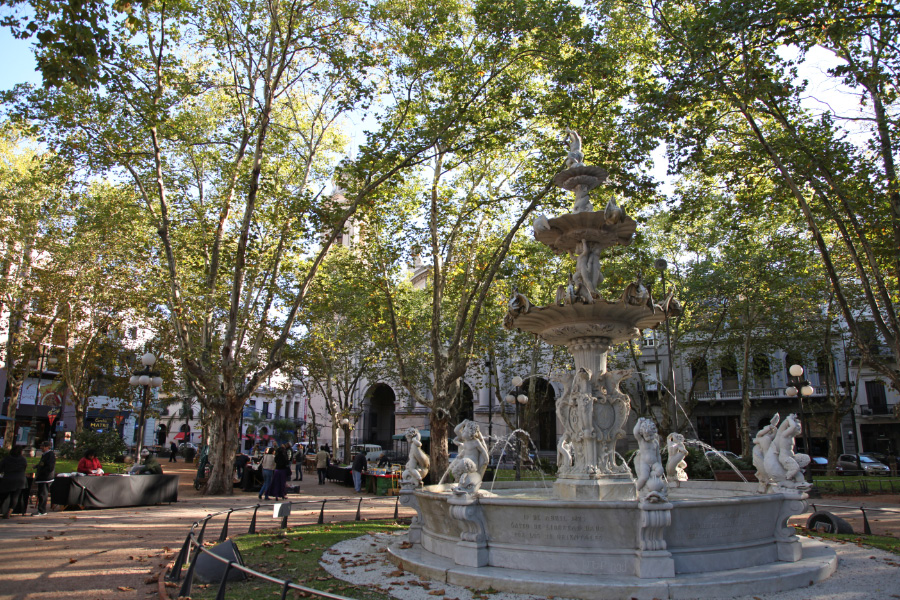 |
| |
|
Church and State – Iglesia y Estado
Catedral Metropolitana de Montevideo Inmaculada Concepción y San Felipe y Santiago
19 de Abril 1825 Grito de Libertad Dado por los 33 Orientales
Opened on 18 July 1871, Fuente de la Plaza de la Constitución by Italian Juan Ferrari (1836-1918) |
| |
... Significant adult life overlap with United States Presidents:
Cleveland, Harrison, McKinley, T. Roosevelt, Taft, Wilson, Harding,
Coolidge, Hoover (born 10 August 1874), F. Roosevelt, Truman, and Eisenhower |
|
| |
|
|
| |
... Significant adult overlap with French Presidents:
Émile Loubet, Armand Fallieres, Raymond Poincaré, Paul Deschanel,
Alexandre Millerand, Gaston Doumergue, Paul Doumer, Albert Lebrun |
|
| Kaiser Wilhelm II |
27 January 1859 – 4 June 1941 |
|
| Madison Grant |
19 November 1865 in NYC – 30 May 1937 in NYC |
|
| Old Dolf |
20 April 1889 – 30 April 1945 |
|
(Adolf Hitler that is, not to be confused
with the Trotskyite and suicide,
Adolf Abramovich Ioffe –
Адольф Абрамович Иоффе
|
1883-1927) |
|
| |
|
|
| |
|
|
| Józef Klemens Piłsudski |
5 December 1867 – 12 May 1935 |
|
| Józef Beck |
4 October 1894 – 5 June 1944 |
|
| |
|
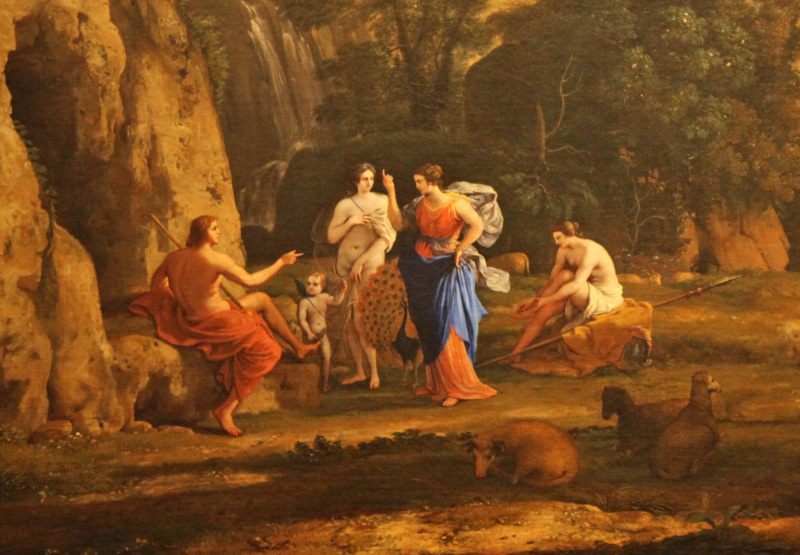 |
| |
|
... detail from the Judgment of Paris, by Claude Lorrain |
|
|
|
| |
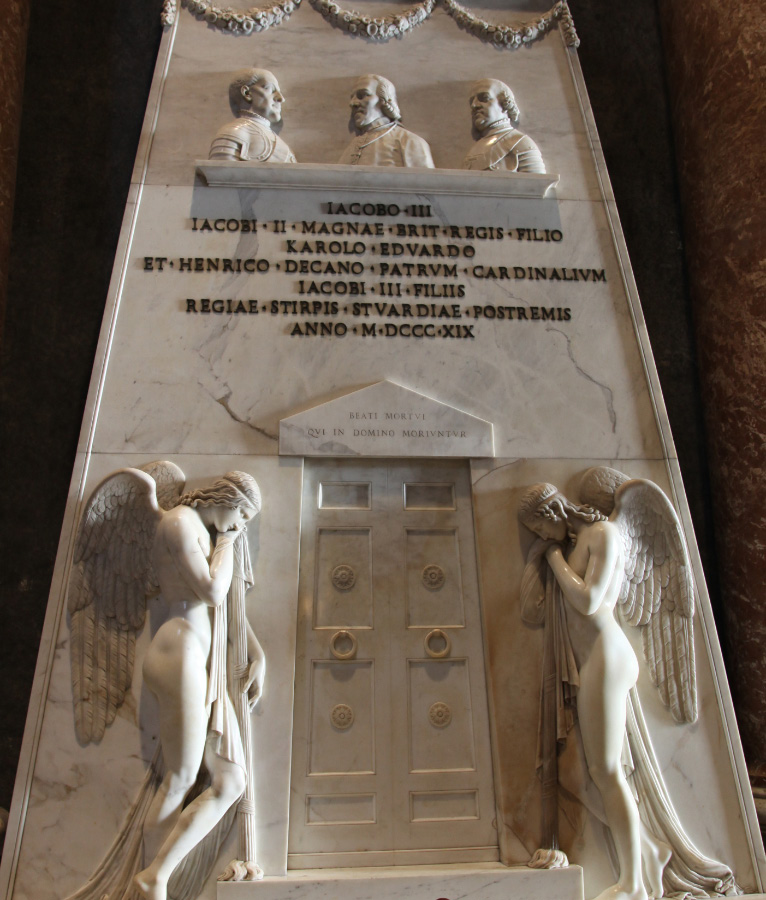 |
|
| |
Detail from the Monument by Antonio Canova to the Royal Stuarts in Saint Peter's Basilica which so impressed Belloc after he walked across the Alps and to Rome and to the Basilica from his then home in central France in 1902. |
|
| Arthur James Balfour |
25 July 1848 – 19 March 1930 |
|
|
|
| Herbert Henry Asquith |
12 September 1852 – 15 February 1928 |
|
|
|
| David Lloyd George |
17 January 1863 – 26 March 1945 |
|
|
|
| Stanley Baldwin |
3 August 1867 – 14 December 1947 |
|
Pope Pius IX |
r. 16 June 1846 – 7 February 1878 |
| James Ramsay MacDonald |
12 October 1866 – 9 November 1937 |
|
Pope Leo XIII |
r. 20 February 1878 – 20 July 1903 |
| Arthur Neville Chamberlain |
18 March 1869 – 9 November 1940 |
|
Pope Pius X |
r. 4 August 1903 – 20 August 1914 |
| |
|
|
Pope Benedict XV |
r. 3 September 1914 – 22 January 1922 |
| Winston Leonard Spencer-Churchill |
30 November 1874 – 24 January 1965 |
|
Pope Pius XI |
r. 6 February 1922 – 10 February 1939 |
| |
|
|
Pope Pius XII |
r. 2 March 1939 – 9 October 1958 |
| Victoria |
24 May 1819 (r. from 20 June 1837) – 22 January 1901 |
|
|
|
| Edward VII |
9 November 1841 (r. from 22 January 1901) – 6 May 1910 |
|
|
|
| George V |
3 June 1865 (r. from 6 May 1910) – 20 January 1936 |
|
|
|
| |
|
|
|
|
... and of course:
|
|
|
|
|
| George Bernard Shaw |
26 July 1856 – 2 November 1950 |
|
|
|
| |
|
|
|
|
| Herbert George "H. G." Wells |
21 September 1866 – 13 August 1946 |
|
|
|
| |
|
|
|
|
| |
"Gentlemen of honour, according to the old standards, rode horses, raced chariots, fought, and played competitive games of skill, and the dull, cowardly and base came in thousands to admire, and howl, and bet. The gentlemen of honour degenerated fast enough into a sort of athletic prostitute, with all the defects, all the vanity, trickery, and self-assertion of the common actor, and with even less intelligence. Our Founders made no peace with this organisation of public sports. They did not spend their lives to secure for all men and women on the earth freedom, health, and leisure, in order that they might waste lives in such folly.”
|
|
|
| |
– Excerpt from A Modern Utopia (1905), by H. G. Wells – |
|
|
| |
|
|
|
|
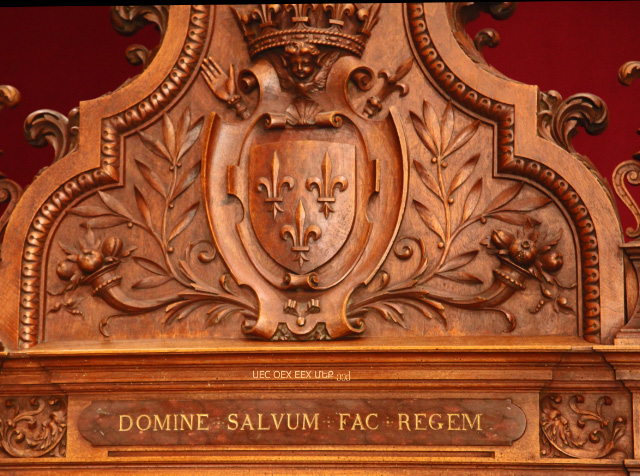
... the Divine Right of Kings celebrated on a wooden chair in Versailles. |
|
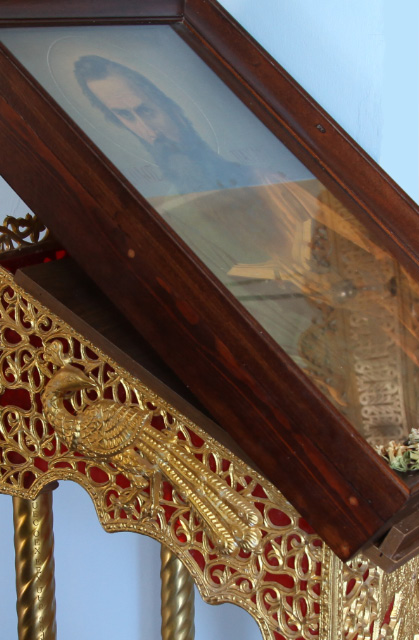 |
| |
|
Καλοί Λιμένες, Κρήτη - Kaloi Limenes, Crete |
| Man is a viator. His earthy destiny is to be on his way somewhere. |
| Mendicante – Mendicant – Mendiants – Bettler – Beggar – Нищенствующих |
| Members of those religious orders which, originally, by vow of poverty renounced all proprietorship not only individually but also (and in this differing from the monks) in common, relying for support on their own work and on the charity of the faithful. Hence the name of begging friars |
| |
from the Catholic Encyclopedia (1913) |
|
1917 Codex Iuris Canonici – Code of Canon Law (the Pio-Benedictine Code, which it was forbidden to translate, though an English translation is offered):
Canon 2117.
Ad beatificationem Servorum Dei requiruntur duo tantum miracula, si testes oculati in utroque processu tum informativo tum apostolico probationem virtutum confecerint, vel si testes, in processu apostolico excussi, fuerint saltem ex auditu a videntibus; tria, si testes fuerint oculati in processu informativo et de auditu auditus in processu apostolico; quatuor, si in utroque processu de virtutibus constiterit per solos testes traditionis et per documenta.
For the beatification of Servants of God, there are required only two miracles, if eyewitnesses in either informative or apostolic process can provide proof of virtues or if the witnesses examined in the apostolic process at least [testify] concerning what they heard from eyewitnesses; three [miracles are required] if the eyewitnesses [were questioned] in the informative process about what they heard from others who were heard in the apostolic process; four [miracles are required] if the virtues were proven in either process only through witnesses who testified from tradition or [who have such knowledge only from] documents.
Canon 2138.
§1. Ad canonizationem Beatorum qui formaliter beatificati sunt, requiritur approbatio duorum miraculorum, quae supervenerint post formalem beatificationem.
§2. Ad canonizationem vero Beatorum, qui aequipollenter fuerunt beatificati, requiritur approbatio trium miraculorum, quae post aequipollentem beatificationem patrata sint.
§ 1 For the canonization of Blesseds who were formally beatified, the approval of two miracles is required that occurred after formal beatification.
§ 2 But for the canonization of those Blesseds who were beatified equivalently, the approval of three miracles is required that have been worked after the equivalent beatification.
1983 Codex Iuris Canonici – Code of Canon Law, the codification of canonical legislation for the Latin Church:
Canon 1403.
§1. Special pontifical law governs the causes of canonization of the servants of God.
§2. The prescripts of this Code, however, apply to these causes whenever the special pontifical law refers to the universal law, or norms are involved which also affect these causes by the very nature of the matter.
And the special pontifical law referred to in §1 of Canon 1403 is Pope John Paul II's Apostolic Constitution Divinus Perfectionis Magister of 25 January 1983 |
... all miracles created equal?... |
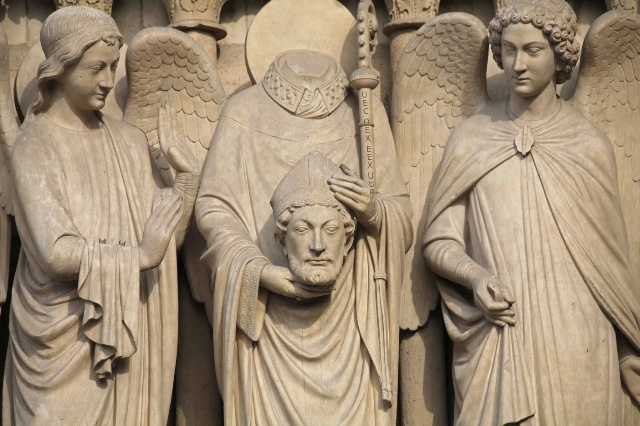
Saint Denis - Dionysius cephalophore on the facade of the Cathedral of Notre Dame de Paris |
| |
|
|
| |
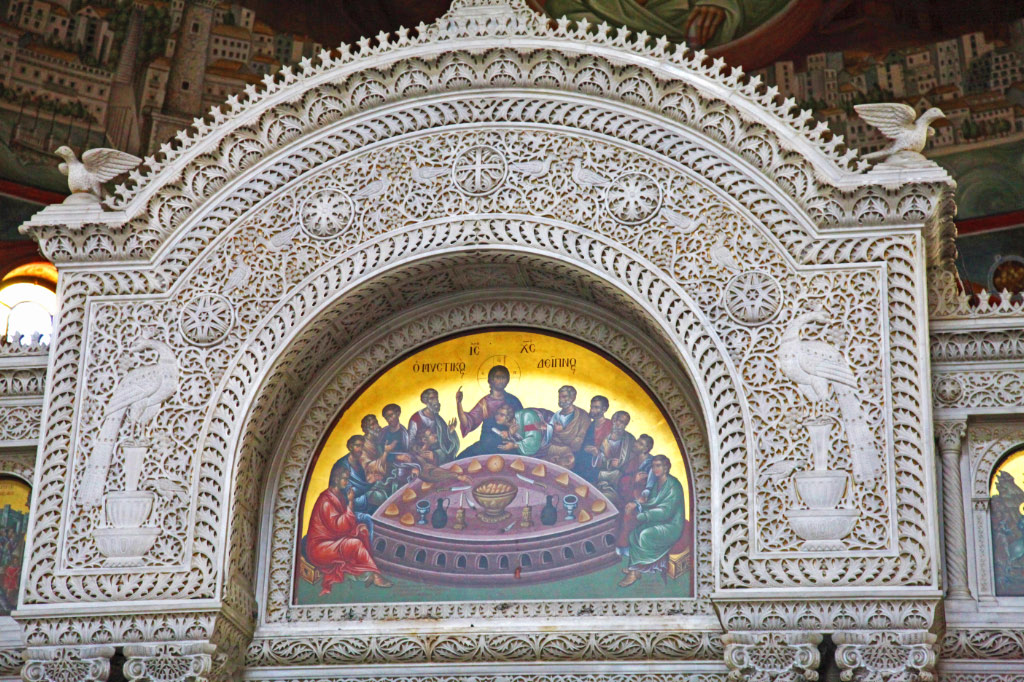 |
| |
|
Άγιος Ανδρέας - Saint Andrew's Greek Orthodox Basilica in Patras, Greece |
| |
|
... and younger men, still sort of within their times: |
|
|
|
| |
|
|
|
|
|
|
| |
|
Ludwig Heinrich Edler von Mises
(notwithstanding the von bit, an atheist, excuse me, agnostic, Jew, like most of the Mammon worshippers at the institute which now bears his, not Hayek's, name.) |
|
29 September 1881 – 10 October 1973 |
|
| |
|
|
|
|
|
|
| |
|
Dietrich von Hildebrand |
|
12 October 1889 – 26 January 1977 |
|
| |
|
Martin Heidegger |
|
26 September 1889 – 26 May 1976 |
|
| |
|
|
|
|
|
|
| |
|
|
|
|
|
|
| |
|
Venerable Archbishop Fulton John Sheen |
|
Peter John Sheen 8 May 1895 – December 9, 1979 |
|
| |
|
Nicolas Michaelovich Zernov |
|
9 October 1898 [O.S. 21 September] – 25 August 1980 |
|
| |
|
Clive Staples Lewis |
|
29 November 1898 – 22 November 1963 |
|
| |
|
|
|
|
|
|
| |
|
|
|
|
|
|
| |
|
A. K. Chesterton,
(Oh' wait, that was a different guy and a different time.) |
|
1 May 1899 – 16 August 1973 |
|
| |
|
Friedrich August von Hayek |
|
8 May 1899 Vienna – Freiburg im Breisgau 23 March 1992 |
|
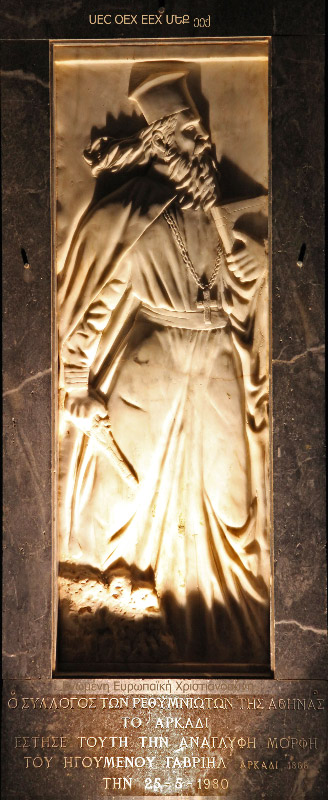
pistol packing priest outside Metropolitan Cathedral
of Rethymnon, Crete, Greece |
... and decidedly not within their times: |
|
... seems like many civilizational shifting and transforming events happening within the space of five years? |
| |
|
|
Second Vatican Council - Concilium Oecumenicum Vaticanum Secundum - Vatican II
The Twenty-First Ecumenical Council in Catholic reckoning, charitably, an important local pastoral council in Orthodox and Oriental Orthodox understaning. |
|
11 October 1962 – 8 December 1965 |
| |
|
|
| Abandonment of the Papal Coronation ceremony |
|
1963 |
| |
|
|
| The Ankara Agreement, decision of European Community leadership to sell out Europe to Muslim Turkey through mass immigration, und so weiter. |
|
12 September 1963 |
| |
|
|
| The United States Civil "Rights" Act of 1964 |
|
|
| The United States Immigration and Nationality Act of 1965 |
|
|
|
|
|
| Abandonment of the decency standards for motion pictures which were embedded in and administered by the Motion Picture Production Code system from 1930 until 1968, and which, up until that time had seriously throttled a major portion of the program, varyingly tacit and explicit, of entirely Jew -owned, -controlled and -directed Hollywood, to undermine, and eventually eliminate, the Christian fabric of American society, and eventually that of all of Christendom, or at least European Christendom, most especially through mind- and spirit-numbing pornographic images and drama. In fairness it should be added that from May 1967 to June 1968 the Supreme Court of the United States, the "Warren Court" rendered 27 decisions effectively making it illegal for states to make illegal pornography. The Jews always have help. |
|
1968 |
| |
|
|
| |
|
|
Griswold v. Connecticut, 381 U.S. 479.
Not a household phrase in the way Roe v. Wade (1973) is, in terms of Anglo-American jurisprudence Griswold is the more ground-shifting of the two cases. In it the U.S. Supreme Court legislated from the bench, creating a Constitutional right to privacy out of imagined "emanations and penumbras" of other constitutional protections in order to rule unconstitutional a Connecticut law prohibiting artificial contraception. Of course this constitutional "right to privacy" dissolves into the ether when advantageous for the enemies of the Church and Christendom. |
|
7 June 1965 |
| |
|
|
|
|
|
| The publication of "Molecular Structure of Nucleic Acids: A Structure for Deoxyribose Nucleic Acid," by Francis Crick and James D. Watson, and countless other scientific advancements, giving us all much greater insights into why pumpkins remain pumpkiny. It really would be more truthful and productive to recognize in Chesterton and in Belloc collaborators in proto- United European Christendom, as they in fact are, and not to present them as infallable quasi-deities. |
|
25 April 1953 |
| |
|
|
| The emergence of a class of very rich and super rich entrepreneur-inventors and -industrialists, often emerging from a background of little or zero inherited wealth, much less inherited titles, working much harder than the average man, often into advanced old age or up until death, and often uninterested in luxurous living, displays of wealth or the art, architecture and music which yesteryear's noble classes supported financially if not intellectually, and very much atheist or agnostic and very much not friends of the Church or of Christendom or of Christian morality and values. |
|
|
|
|
| Why? |
United European Christendom, the film, this present website, the movement, the idea, the actual historicity and character of Christian Europe, this is not about Chesterton or Belloc or their writings. Less still is the reunification of the Catholic Church, the Orthodox Churches and the Oriental Orthodox Churches into the Orthodox-Catholic Church about or somehow guided by Belloc or by Chesterton or somehow constrained by their thinking. All this is not about them. And if a personal note may be permitted or at least forgiven, with some minor exceptions, the present writer did not begin in earnest to read the writings of Chesterton or Belloc until early 2013, while the United European Christendom project, though not yet bearing that name, was in contemplation more than a decade earlier, with first concrete steps undertaken in the earliest days of 2006.
So why construct this Chesterbelloc webpage, and why write the just preceding disclaimer, jettisoning potential support for United European Christendom of a network of ready-made reading circles and clubs focused on Chesterton and his writings, and by extension on Belloc? Truth for its own sake is one good answer, but in fact many of those clubs in equal measure propagate and distort the teaching and insights of Chesterton and of Belloc. One obvious example of distortion are their contrived efforts and arguements to prove that Chesterton and Belloc were not ... drum roll please ... "antisemites". Even the use of this word, borrowed from the enemies of Church and Christendom, indicates sloppy thinking ... or worse. No, Belloc and Chesterton were not anti-Maltese. And no, neither man was inclined to deny or whitewash the pernicious and poisonous dominant theme attached to the atheist and Talmudic Jew within Christendom. Likewise no, a desire to see Chesterton canonized does not supply a holy justification for distortions regarding what both men were all about, though such distortions do include an implicit acknowledgement that deception is necessary if the canonization process is to march past the Fifth Column of traitor priests and bishops and cardinals within the Catholic Church who embrace, in varying degrees of openness, the heresy of Dual-Covenant "Theology," usually as an important component part of a package of heterodoxy and Homosexualism. – And when distortions come, they come not single spies but in battalions. – One should probably also add that, no, having read six times every word Chesterton ever wrote does not convert into truth errors in literary summary or biography.
More specific to present themes, Orthodox and Catholic reunification seems to have hardly been on Belloc or Chesterton's radar screens. Moreover, on those few occasions when such issues do arise, these two are as likely to be wrong in their understanding and conclusions as to be right. One thinks for example of Belloc's brief remarks in his otherwise remarkable 1936 work, The Great Heresies, to the effect that the Coptic Church is Monophysite and really just an extension of the Arian heresy. In fact the Oriental Orthodox Churches are not, and they never have been, Monophysite. They are Miaphysite, and even though Belloc (and Chesterton) did not have the benefit of access to the Joint Orthodox-Oriental Orthodox and the joint Catholic-Oriental Orthodox Agreed Statements on Christology of recent decades, still Belloc's thinking on the question of the Coptic theology can not be described as profound ... or accurate.
And another point, not about Belloc or Chesterton, but about those Chestertonian individuals and clubs skirting and flirting with idolatry over them. It is a question of degrees perhaps. In this present work they are also called "British intellectual and literary giants," infra, but please embrace caution and introspection here, lest a different kind of distortion creep in and serve to undermine their work and lives. Second only to their individual commitments to God and Christendom, but also intertwined with those, Hilaire Belloc and Gilbert Chesterton were Populists. They rejected elitism, intellectual and economic. They did not project the world view of the Greek ancients in which masses of slaves made possible the leisure of a small class of philosophers. Theirs was an imagined world of poetry-composing and poetic song singing innkeepers and infantrymen. How well did either man approach this populist ideal in the daily comings and goings of his own life? Both warded off hypocrisy perfectly? It is not difficult to believe that both had friendly smiles and passing words for everybody they encountered. It is more of a challenge, to put the point mildly, to imagine that real interest and access were not restricted to those whom they respectively considered to be particularly interesting, to be, in that far, their equals. Still, do you cringe when you hear one or another decades-long, career Chestertonian spend half, or some other strikingly large portion, of the time spent in delivering prepared remarks trying to convince one and all of how set apart, how exceptional, how not like other men, how much better than other men Chesterton and his buddy Belloc were? Maybe start.
Chesterton and Belloc made fine contributions to Christendom. They were also limited men, like the rest of us.
And consider please, except in providing an extensive literary record with finely-crafted arguements on a range of key themes, on every major point about which Belloc and Chesterton cared most, save the destiny of their own souls, Chesterton and Belloc failed. As of this writing, about 80 years have gone by since they both stopped writing. Where is their success, to date, to be found? The civilizationally-destructive components of the pan-heresy of Modernism have been stopped or slowed? The integrity of the Church has been successfully defended or even bettered since Vatican II? We can all feel more secure in the bosom of God's Holy Church now that a 26-plus-years Roman Pontiff spent essentially all of those years in a de facto, bless us all, not de jure, embrace of the Dual Covenant arch-heresy, when he was not Koran kissing, that is, or in the fact that the spirit of Vatican II Church both beatified and canonized this saintly Koron kisser within eight years of his death. (And note here, the foremost prominent Chestertonian is on record, and on national television, calling him Pope John Paul the Great, and that toward the end of this pope's quarter-century tour of apostacy; and that same career Chestertonian also invites as the keynote speaker to his signature annual conference a prominent professor who, arrogantly and absurdly, is on public and recorded record calling John Paul "the greatest man in the world".) But to move away from their self-designated champions and back to the men themselves, with and after Chesterton and Belloc, was War II averted? How about Catholic social teaching, economic Populism and Distributism, how have they fared since 1936? Wealth, ownership of productive property is more evenly distributed now, Capitalism is less objectionable because there are now more capitalists? Regarding basic public morality, what about, for example, pornography then and now? At the time when When Chesterton passed from this Earth and Belloc stopped writing, the Motion Picture Production Code, the Hays Code, was at work, doing a decent job of bridling in the worst, and most usual, impure impulses and inclinations of Jew Hollywood. And now? What about the family and its sanctity, the respect of children for parents, the dearth of divorce, the absence of abortion, any progress discernable there, flowing from Chesterton and Belloc's lives and from the vast corpus of their written work?
OK, enough. A person could craft highly strained arguments, by their nature not disprovable, that things would be still worse without their shared legacy. Here at United European Christendom it seems far more productive to allow as a counterbalance to the above disclaimer, that this effort is not about Chesterton or Belloc, the claim, and this shall be that within a Democracy which includes the Dead, these two men, G.K. Chesterton and Hilaire Belloc, are committed and exquisite collaborators in and with the project which is United European Christendom. This will be achieved by combining their work with the work of others, not by regarding them as the infallible solvers of every problem. |
| |
|
| |
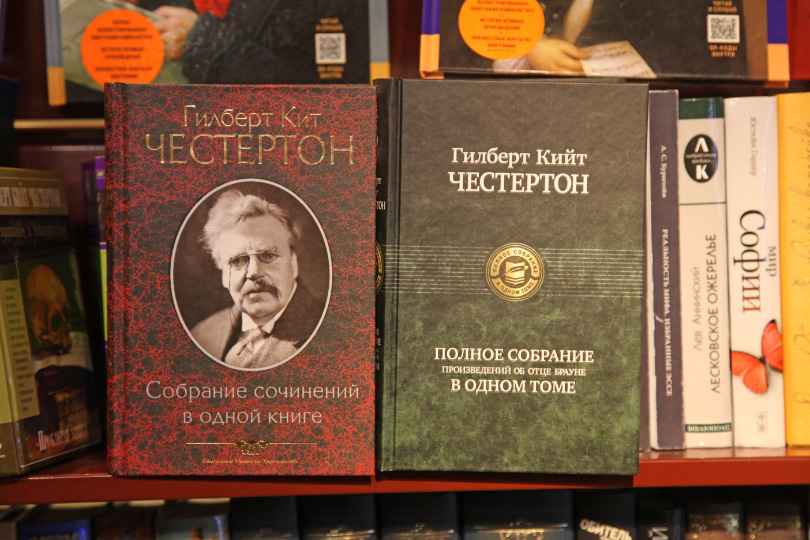 |
|
| |
In Saint Petersburg, Собрание Сочинений – Collected Works and – Отец Браун – Father Brown |
|
| |
Men of [Asia] will submit to very low wages for the same reason that they will submit to "the punishment known as Li, or Slicing"; for the same reason that they will praise polygamy and suicide; for the same reason that they subject the wife utterly to the husband or his parents; for the same reason that they serve their temples with prostitutes for priests; for the same reason that they sometimes seem to make no distinction between sexual passion and sexual perversion. They do it, that is, because they are Heathens; men with traditions different from ours about the limits of endurance and the gestures of self-respect. They may be very much better than we are in hundreds of other ways; and I can quite understand a man (though hardly a Dean [of a Church]) really preferring their historic virtues to those of Christendom. A man may perhaps feel more comfortable among his Asiatic coolies than among his European comrades: and as we are to allow the Broadest Thought in the Church, Dr. Inge has as much right to his heresy as anybody else. It is true that, as Dr. Inge says, there are numberless Orientals who will do a great deal of work for very little money; and it is most undoubtedly true that there are several high-placed and prosperous Europeans who like to get work done and pay as little as possible for it. |
| |
|
From Chesterton's essay, The New Theologian, in his 1912 compilation of essays, A Miscellany of Men. |
| |
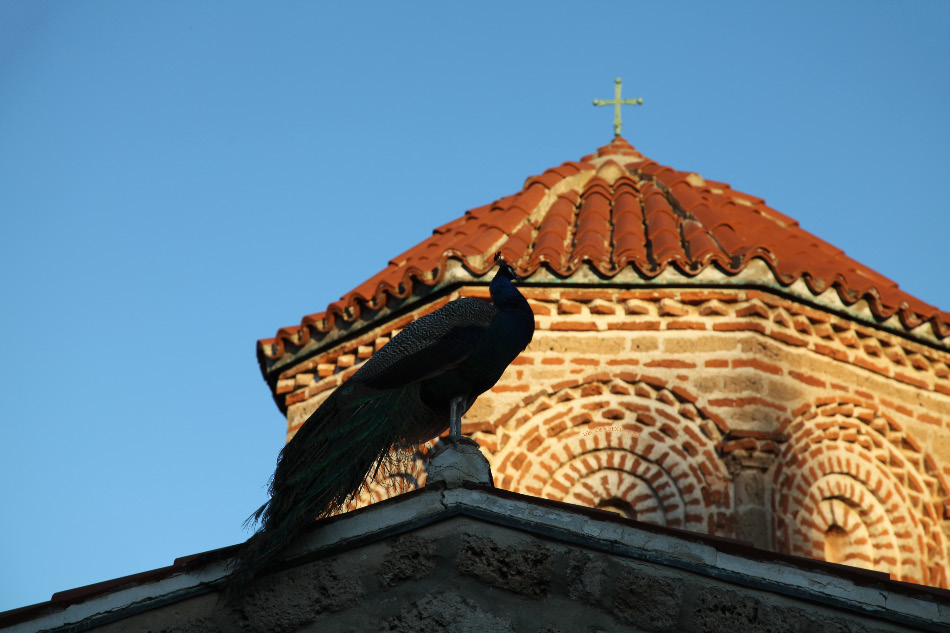 |
|
| |
... atop the Манастир „Свети Наум“ – Monastery of Saint Naum, founded by the saint in 905 Anno Domini on Lake Ohrid, Macedonia. |
|
|
|
|
| |
The Sabbatical Year
The Lord said to Moses on Mount Sinai, 2 “Say to the people of Israel, When you come into the land which I give you, the land shall keep a sabbath to the Lord. 3 Six years you shall sow your field, and six years you shall prune your vineyard, and gather in its fruits; 4 but in the seventh year there shall be a sabbath of solemn rest for the land, a sabbath to the Lord; you shall not sow your field or prune your vineyard. 5 What grows of itself in your harvest you shall not reap, and the grapes of your undressed vine you shall not gather; it shall be a year of solemn rest for the land. 6 The sabbath of the land shall provide food for you, for yourself and for your male and female slaves and for your hired servant and the sojourner who lives with you; 7 for your cattle also and for the beasts that are in your land all its yield shall be for food.
The Year of Jubilee
“And you shall count seven weeks of years, seven times seven years, so that the time of the seven weeks of years shall be to you forty-nine years. 9 Then you shall send abroad the loud trumpet on the tenth day of the seventh month; on the day of atonement you shall send abroad the trumpet throughout all your land. 10 And you shall hallow the fiftieth year, and proclaim liberty throughout the land to all its inhabitants; it shall be a jubilee for you, when each of you shall return to his property and each of you shall return to his family. 11 A jubilee shall that fiftieth year be to you; in it you shall neither sow, nor reap what grows of itself, nor gather the grapes from the undressed vines. 12 For it is a jubilee; it shall be holy to you; you shall eat what it yields out of the field.
“In this year of jubilee each of you shall return to his property. 14 And if you sell to your neighbor or buy from your neighbor, you shall not wrong one another. 15 According to the number of years after the jubilee, you shall buy from your neighbor, and according to the number of years for crops he shall sell to you. 16 If the years are many you shall increase the price, and if the years are few you shall diminish the price, for it is the number of the crops that he is selling to you. 17 You shall not wrong one another, but you shall fear your God; for I am the Lord your God.
“Therefore you shall do my statutes, and keep my ordinances and perform them; so you will dwell in the land securely. 19 The land will yield its fruit, and you will eat your fill, and dwell in it securely. 20 And if you say, ‘What shall we eat in the seventh year, if we may not sow or gather in our crop?’ 21 I will command my blessing upon you in the sixth year, so that it will bring forth fruit for three years. 22 When you sow in the eighth year, you will be eating old produce; until the ninth year, when its produce comes in, you shall eat the old. 23 The land shall not be sold in perpetuity, for the land is mine; for you are strangers and sojourners with me. 24 And in all the country you possess, you shall grant a redemption of the land.
“If your brother becomes poor, and sells part of his property, then his next of kin shall come and redeem what his brother has sold. 26 If a man has no one to redeem it, and then himself becomes prosperous and finds sufficient means to redeem it, 27 let him reckon the years since he sold it and pay back the overpayment to the man to whom he sold it; and he shall return to his property. 28 But if he has not sufficient means to get it back for himself, then what he sold shall remain in the hand of him who bought it until the year of jubilee; in the jubilee it shall be released, and he shall return to his property.
“If a man sells a dwelling house in a walled city, he may redeem it within a whole year after its sale; for a full year he shall have the right of redemption. 30 If it is not redeemed within a full year, then the house that is in the walled city shall be made sure in perpetuity to him who bought it, throughout his generations; it shall not be released in the jubilee. 31 But the houses of the villages which have no wall around them shall be reckoned with the fields of the country; they may be redeemed, and they shall be released in the jubilee. 32 Nevertheless the cities of the Levites, the houses in the cities of their possession, the Levites may redeem at any time. 33 And if one of the Levites does not exercise his right of redemption, then the house that was sold in a city of their possession shall be released in the jubilee; for the houses in the cities of the Levites are their possession among the people of Israel. 34 But the fields of common land belonging to their cities may not be sold; for that is their perpetual possession.
“And if your brother becomes poor, and cannot maintain himself with you, you shall maintain him; as a stranger and a sojourner he shall live with you. 36 Take no interest from him or increase, but fear your God; that your brother may live beside you. 37 You shall not lend him your money at interest, nor give him your food for profit. 38 I am the Lord your God, who brought you forth out of the land of Egypt to give you the land of Canaan, and to be your God.
“And if your brother becomes poor beside you, and sells himself to you, you shall not make him serve as a slave: 40 he shall be with you as a hired servant and as a sojourner. He shall serve with you until the year of the jubilee; 41 then he shall go out from you, he and his children with him, and go back to his own family, and return to the possession of his fathers. 42 For they are my servants, whom I brought forth out of the land of Egypt; they shall not be sold as slaves. 43 You shall not rule over him with harshness, but shall fear your God. 44 As for your male and female slaves whom you may have: you may buy male and female slaves from among the nations that are round about you. 45 You may also buy from among the strangers who sojourn with you and their families that are with you, who have been born in your land; and they may be your property. 46 You may bequeath them to your sons after you, to inherit as a possession for ever; you may make slaves of them, but over your brethren the people of Israel you shall not rule, one over another, with harshness.
“If a stranger or sojourner with you becomes rich, and your brother beside him becomes poor and sells himself to the stranger or sojourner with you, or to a member of the stranger’s family, 48 then after he is sold he may be redeemed; one of his brothers may redeem him, 49 or his uncle, or his cousin may redeem him, or a near kinsman belonging to his family may redeem him; or if he grows rich he may redeem himself. 50 He shall reckon with him who bought him from the year when he sold himself to him until the year of jubilee, and the price of his release shall be according to the number of years; the time he was with his owner shall be rated as the time of a hired servant. 51 If there are still many years, according to them he shall refund out of the price paid for him the price for his redemption. 52 If there remain but a few years until the year of jubilee, he shall make a reckoning with him; according to the years of service due from him he shall refund the money for his redemption. 53 As a servant hired year by year shall he be with him; he shall not rule with harshness over him in your sight. 54 And if he is not redeemed by these means, then he shall be released in the year of jubilee, he and his children with him. 55 For to me the people of Israel are servants, they are my servants whom I brought forth out of the land of Egypt: I am the Lord your God. |
|
| |
|
Leviticus 25 |
|
| |
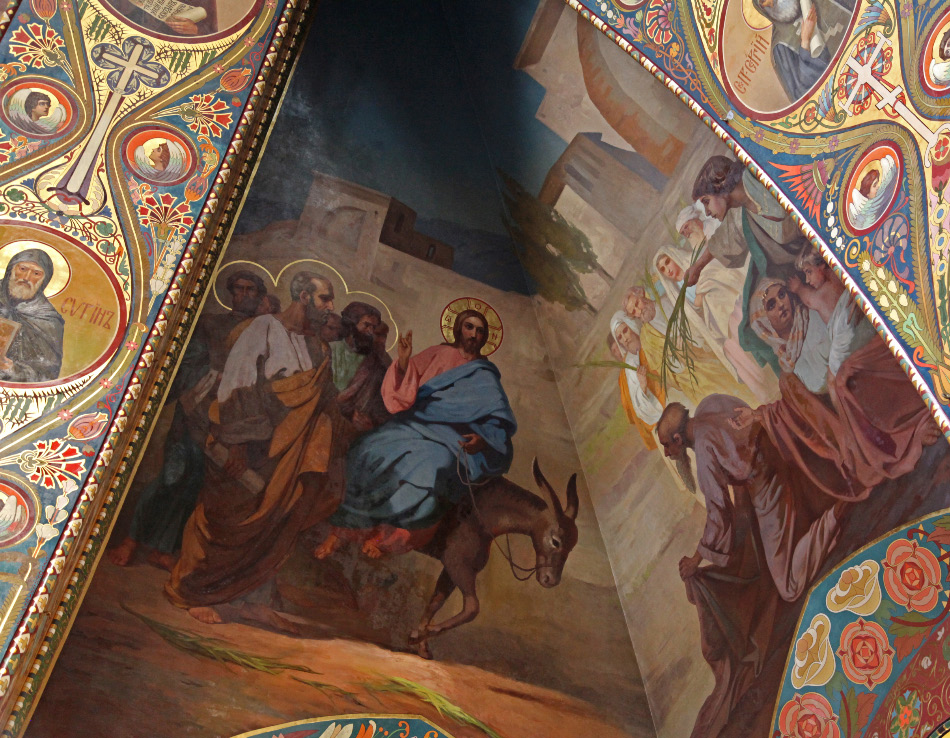 |
|
| |
... в Храме Успения Пресвятой Богородицы в г. Санкт-Петербурге ...in the Church of the Dormition in Saint Petersburg |
|
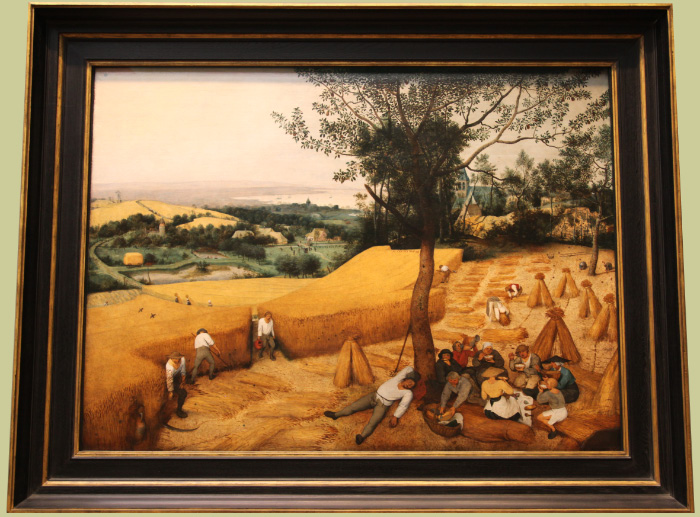 |
|
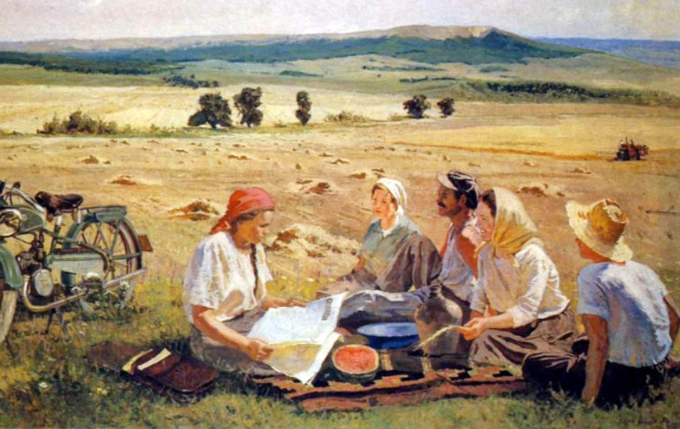
|
De Oogst, (1565) van Pieter Bruegel de Oudere (c. 1525 – Brussel, 9 September 1569) –
The Harvest (1565) by Pieter Bruegel the Elder, Metropolitan Museum of Art |
|
О нас пишут в Правде, 1951 живопись Алексея Александровича с Васильевым
They are writing about us in Pravda, (1951) by Aleksei Alexandrovich Vasilyev |
| ... Distributism . |
As one might readily guess, the writer of a website like the present effort is in no position to criticize others for embracing projects which can charitably be called, well ... aspirational. This said, the year is 2015, not 1912, when Belloc wrote The Servile State, or even 1927, when Chesterton wrote The Outline of Sanity, but even in those days, to be sustainably viable must Distributism be linked with some variant of the Biblical Jubilee? |
|
| |
|
|
 Cretean Peacocks, from Church in Rethymno Cretean Peacocks, from Church in Rethymno
|
|
|
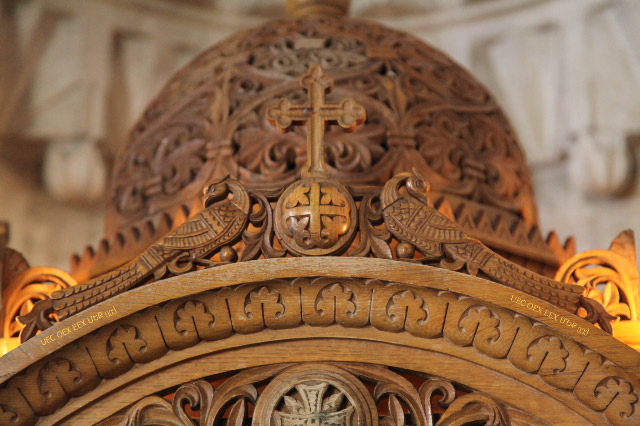 |
| |
|
|
from Church of Saint Titus in Heraklion on Crete in Greece |
| |
Lepanto, a poem by G. K. Chesterton |
|
|
|
|
| |
|
|
|
|
| WHITE |
|
|
|
|
| |
|
|
|
|
| |
|
|
|
|
| |
|
white republics |
|
|
| |
|
|
|
|
| |
|
Christendom |
|
|
| |
|
|
|
|
| |
|
Europe |
|
|
| |
|
|
|
|
| |
|
|
|
|
| |
Death-light of Africa! |
|
|
|
| |
|
|
|
|
| |
Mahound |
|
|
|
| |
|
|
|
|
| |
Black Azrael and Ariel and Ammon |
|
|
| |
|
|
|
|
| |
|
|
|
|
| |
|
the yellow gods shut up their eyes in scorn |
|
| |
|
|
|
|
| |
|
|
|
|
| |
And above the ships are palaces of brown, black-bearded chiefs,
And below the ships are prisons, where with multitudinous griefs,
Christian captives sick and sunless, all a labouring race repines
Like a race in sunken cities, like a nation in the mines. |
|
| |
|
|
|
|
| |
And many a one grows witless in his quiet room in hell
Where a yellow face looks inward through the lattice of his cell |
|
|
| |
|
|
|
|
| |
|
|
|
|
| |
Thronging of the thousands up that labour under sea
White for bliss and blind for sun and stunned for liberty. |
|
|
| |
|
|
|
|
| |
|
|
|
|
| |
|
|
|
Crusade |
| |
|
|
|
...the full poem, Lepanto, by G. K. Chesterton. |
|
|
|
|
|
| |
In point of readily demonstrable fact, both Gilbert Chesterton and Hilaire Belloc embraced positions regarding the understanding of, the definition of Christendom and Christendom's peoples which were, more extreme yes certainly, but really qualitatively different from that embraced and proposed by the present writer. (One should perhaps rather write position in the singular, Chesterton's and Belloc's thinking and writing on the matter having been indistinguishable one from the other.) It should also be added that such differences, between their thinking on the one hand and my own on the other, are partially, but only partially, accounted for by the fact that I am writing 80 or 100 years after they did on the topic. For me Europe, including Europe abroad, Europe in and on all the seven continents at this point in history, all of European Christendom is only a component part of what Christendom is and is growing into, or indeed contracting into.
For them Christendom equalled Europe; was completely coterminous with Europe; was the older term for Europe which had fallen into disuse over time, with the decades preceding and following the year 1700 pivotal in the process of Europe supplanting Christendom as the term in common usage to describe the same lands. And this was an intensely negative, unfortunate, but actually sinful and evil development in their minds and writings, a consequence of Protestant and Catholic embarrassment at being reminded of their common civilizational heritage. (Big "O" Orthodoxy, not entirely absent, still was not much on the radar screens of these two British intellectual and literary giants.) But consider, these men were writing at the end of the nineteenth, and more so still in the beginning of the twentieth century. (Though the four-years older Belloc survived Chesterton by seventeen years, their most productive literary years largely overlapped.) And yet consider also:
- The Ethiopians were monotheistic before Christ's Incarnation, and they quite rightly point to their Christian heritage of 2000, not 1000, years (Acts 8:26-39);
- Rediscovered in Xi'an in c. 1623/5 during the late Ming Dynasty, the Nestorian stele was erected during the Tang Dynasty in 781 Anno Domini, Christian missionaries having arrived in China perhaps 150 years earlier;
- Juan Diego received the glorious gift of Marian apparitions in Mexico in 1531;
- Francisco de Jasso y Azpilicueta – Saint Francis Xavier, S.J. (* 7 April 1506 – 3 December 1552 †), arrived in and began his missionary work in Japan in 1547. A half century later — when 26 mártires de Japón – 日本二十六聖人 – Twenty-Six Martyrs of Japan, were crucified for The Faith in Nagasaki on 5 February 1597 on the orders of the feudal warlord, the Daimyō, 豊臣 秀吉 Toyotomi Hideyoshi — there were 200,000 to 300,000 Catholic Christians in Japan.
- The Jesuits started their missionary work in the Philippines (named after the King Philip with the Fleece about his neck) around 1581, a country which now is, and in the time of Chesterton's and Belloc's writings was, much more than 90 percent Christian (more than 80 percent Catholic), and here one speaks Christians who actually go to Church, even in 2016. (Just ignore their perennial ubiquitous corruption and, like the rest of non-European-Christendom, seeming inability to build a civilization from which its own members do not wish to flee at the first opportunity.);
- The largely mulatto Dominican Republic and its capital Santo Domingo were named after Saint Dominic, the capital city in 1495;
- The larger of the two islands which make up Trinidad and Tobago was named after The Trinity!
This list could be greatly expanded in 2017, and this was certainly not less so the case in 1908 for example, when Chesterton published his signature and seminal work, Orthodoxy, or in 1920, when Belloc came out with Europe and the Faith.
At all events, now about a hundred years on from these and many other writings of Chesterbelloc, it will not do to equate without qualification Christendom with Europe, not even if Europe is held, as it must be by all non-ridiculous persons, to include Europe abroad. Christendom — those lands of the world and their peoples, taken together, in which the Christian religion holds sway or at least where the majority of the people (I would add clear to majority) would include being Christian in their identity — must be understood as being broader, and one might be allowed to hope for the future also deeper, than European Christendom alone.
And yet conversely, those who want Christian character and identity and teaching and morals and faith to be reunited with, reincorporated by European peoples into European communities and lands and into the civilization as a whole, such people must nonetheless recognize that language must communicate meaningful information if it is to gain usage. Maybe it is regrettable, though Chesterton did not seem to think so. Maybe the situation will be far different a thousand years from now and maybe in only a hundred. For now, masses of millions of Frenchmen are not going to start using the term Christendom to refer together to France and to the Philippines.
Likewise geographic distance matters little in this connection. Port-au-Prince is fifteen times closer to Key West than is Christchurch to Krakow. The latter two share a common civilization. The former two do not. Yet the profoundest of writers and the shallowest of journalists alike are, and for centuries running have been, grasping for terms to use when they want to convey information or make arguments common to European Christendom. Secular atheists and assorted active enemies of the Church and those who would take the most passionate exception to orthodox Christianity informing the public discourse must take intense cynical satisfaction that these writers settle for awkward and inaccurate terms and expressions like:
|
|
|
- the West;
- westerner;
- westernizer
- western society; and
- western civilization.
|

Запад – Zapad, West, though rather far North and East, in Arkhangelsk, European Christendom. |
|
Of course it pleases such people when our own sons co-opt the concepts and learn the language of distraction and diversion and dilution, trivialize matters of great moment, make ourselves ridiculous with incessant references to compass directions and color paletes. But should the admirers of G.K. Chesterton and Hilaire Belloc, should those wanting to make common sense more common be likewise contented?
Now in the 21st century — and now that someone has supplied an alternative — consider cringing, or at least recognize that you are dealing with an enemy a coward or a fool, the next time you hear or read someone say or write "the West" or its derivatives.
Perhaps the just preceding sentence is impolitic. Lots of people who could be dear brothers and useful allies in this project are heavily invested in the West. But this website, this project, is not about smart tactics. It is about full truth. If it were about smart tactics and partial truths — hallmarks of the heretic and of the demoniac — one might very well try to team up, spiritually or otherwise, with Talmudic and atheist Jews. No need to try to define it as doctrine. That is impossible. Just, hint around acceptance of the heresy of Dual-Covenant theology, as countless Catholic senior-most Churchmen, and some few Orthodox, have. Collaboration with atheist and Talmudic Jews, for example could be done in order to gain platforms, and funding, to speak the truth about Islam and Muslims. One could just ignore the fact that Jews themselves are the chief enablers of their Muslim nemeses, that lying near the epicenter of the Jew agenda is the promotion of the mass immigration of everyone other than the Descendants of European Christendom into every corner of European Christendom, and that this has created the latter-day civilizational threat which Islam is to Christendom and, paradoxically, to the Jews themselves. But hubris is after all a chief characteristic of those who become drunk on demonaic successes. One wishing to join in with this can make their own expressions like:
- Judeo-Christian civilization;
- Judeo-Christian culture;
- Judeo-Christian ethics;
- Judeo-Christian traditions;
and so forth, as if there can be any unity between those claiming — as do the Talmudic Jews — that Jesus is God's Messiah and Only Begotten Son and those claiming that "he is a sinful creature boiling in hell in excrement." <<<Lord Have Mercy. Christ Have Mercy. Lord Have Mercy>>> None of this has been preventing our most celebrated professors, priests and prelates from kowtowing to Talmudic (and atheist) Jews, aided by one of their dearest quotations:
"The Jewish people are, first of all, the spiritual 'elder brothers' of Christians."
This is false and ignorant, whoever committed such error to writing, endlessly toying with faithful Christians. The Abrahamic Covenant was fulfilled in Christ Jesus, the "seed" (singular) of Abraham. Aspects of the Mosaic law — most prominently the Decalogue, the Ten Commandments — endure. The ritual and ceremonial aspects of the Mosaic law — most prominently Circumcision, a word also standing as synecdoche for the entire "613 Mitzvot" — do not endure. They were a temporary provision which served out their divine purpose in preparation for the coming of the Messiah of God, God Himself, the Second Person of the Most Holy Trinity, Christ Jesus. Indeed, though this point is secondary or of still lower order importance, from the destruction of the Second Temple by the Romans in 70 Anno Domini, and likewise the Temple records regarding the priesthood, the ritual and animal sacrificial and ceremonial aspects of the Mosaic Covenant became impossible to fulfill. Rabbinic – Talmudic Judaism is of more recent origin than the Gospel of Christ. Rabbinic – Talmudic Judaism is a hateful and blasphemous rejection of and reaction to the Gospel of Christ, of Christianity.
Likewise, to avoid fully being in the Church and building Christendom, one could choose to embrace for distraction a different set of partial truths, for example droning on for decades about Zionism being humankind's only problem. There is a lot to write about, and maybe a Saudi oil sheik or the Young Turks could convey some cash to support this brand of myopia. (NB, Reference to the Young Turks is to rebellious Muslim movements generally, and their invariable tendency to take on an anti-Christianity, anti-Church, anti-Christendom agenda, indeed as raison d'être, as with the early XX century Les Jeunes Turcs – Jön Türkler. Reference is certainly not specifically to some third-rate, Turk-Jew-collaboration, blogosphere, propaganda-cum-news organization, however much it may also fit the enemy-of-Christendom mold.)
In fact, maybe one could even try to pull off both. One could pretend to have found some elevated wisdom in Kreeft's Chrislam Plus, Chrislam plus regular obsequiousness to the Jews, often in the form of Shoah references dropped as non-sequiturs into prepared, and well paid for, remarks on other topics.
But one rather thinks that Hilaire Belloc or Gilbert Chesterton would remind us all to remember The Parable of the Seeds which Lord Jesus taught to all humanity.
In His inscrutable providence God has given us, or allowed to us, more than one challenge, more than one enemy to contend with. Whether one likes it, it is observably so. God's Will Be Done. Our own concupiscence, each for each one of us, is certainly among such enemies. There are others. And even though, "our chief peril is not attack; it is decay," it must be understood that the most pernicious manifestation of our decay is to be found in the very writings and sayings of heretics and confusion sowers in the ranks of the most celebrated within the Church, be he priest or prominent professor, prelate, patriarch or even pope.
Let developing the Standing Apostolic Synod be the work of another day, the clearest distinction between " For it has seemed good to the Holy Spirit and to us " and "For it has seemed good to the holy spirit and to me," which distinction was well understood by a nearly united Church over the course of that thousand years nearest in time to the earthly ministry of God the Son.
For now a suggestion please:
You do not make your own the lexicon of the enemies of the Church, of orthodox Christianity and of that civilization which is unashamedly Christian. You say Christendom when Christendom is meant. And when you are positing a position, advancing and argument, offering an observation which is not focused also on the Philippines, Ethiopia and Mexico, say what you in fact mean.
Just say European Christendom!
|
|
| |
|
|
| |
|
|
| |
"Here is a statement clearly and philosophically laid down which we can only content ourselves with flatly denying: 'The fifth rule of our Lord is that we should take special pains to cultivate the same kind of regard for people of foreign countries, and for those generally who do not belong to us, or even have an antipathy to us, which we already entertain towards our own people, and those who are in sympathy with us.' I should very much like to know where in the whole of the New Testament the author finds this violent, unnatural, and immoral proposition. Christ did not have the same kind of regard for one person as for another." |
|
| |
|
Gilbert Keith Chesterton in Tostoy and the Cult of Simplicity, Varied Types (1905). |
|
| |
|
|
| |
Attend closely to the catechisings, and though we should prolong our discourse, let not thy mind be wearied out. For thou art receiving armour against the adverse power, armour against heresies, against Jews, and Samaritans, and Gentiles. Thou hast many enemies; take to thee many darts, for thou hast many to hurl them at: and thou hast need to learn how to strike down the Greek, how to contend against heretic, against Jew and Samaritan. And the armour is ready, and most ready the sword of the Spirit: but thou also must stretch forth thy right hand with good resolution, that thou mayest war the Lord’s warfare, and overcome adverse powers, and become invincible against every heretical attempt. |
|
| |
|
From the Catechetical Lectures of Κύριλλος Α΄ Ἱεροσολύμων – Cyrillus Hierosolymitanus –
Saint Cyril of Jerusalem (* c. 313 to 18 March 386 †) [emphasis added] |
|
| |
" ... I much prefer Red Indians to Turks, not to mention Jews, I speak without prejudice ..."
...
"... No extravagance of hatred merely following on experience of Jews can properly be called a prejudice. ... this new American Anti-Semitism springs from experience and nothing but experience ... These people of the plains have found the Jewish problem exactly as they might have struck oil; because it is there, and not even because they were looking for it.
...
"... And in America the introduction of the negroes was a mistake; but it may yet be found that the sacrifice of the Southern white man to them was even more of a mistake."
...
"The cosmopolitan Jews who are the Communists in the East will not find it so very hard to make a bargain with the cosmopolitan Jews who are Capitalists in the West." |
|
| |
|
From Chesterton's What I Saw in America (1922, the year that Gilbert Keith Chesterton entered the Catholic Church) |
|
|
Selected excerpts from each of, and then links to the full, unabridged text for each of :
|
|
|
| |
|
Land Tenure in the Christian Era (1913) by Hilaire Belloc |
|
|
| |
|
Europe and the Faith, (1920) by Hilaire Belloc |
|
|
| |
|
Survivals and New Arrivals: The Old and New Enemies of the Catholic Church, (1929) by Hilaire Belloc |
|
|
| |
|
The Crusades: The World's Debate, (1937) by Hilaire Belloc |
|
|
| |
|
The Great Heresies, (1938) by Hilaire Belloc |
|
|
| |
|
|
|
|
| |
|
Heretics, (1905) by G. K. Chesterton |
|
|
| |
|
Orthodoxy (1908), by G. K. Chesterton |
|
|
| |
|
The Flying Inn, (1914) by G.K. Chesterton |
|
|
| |
|
What I Saw in America (1922) by G.K. Chesterton |
|
|
| |
|
The Everlasting Man (1925), by G.K. Chesterton |
|
|
 |
|
... and another exceptionally nice donkey from Holy Mount Athos, near Vatopedi Monastery |
| |
|
|
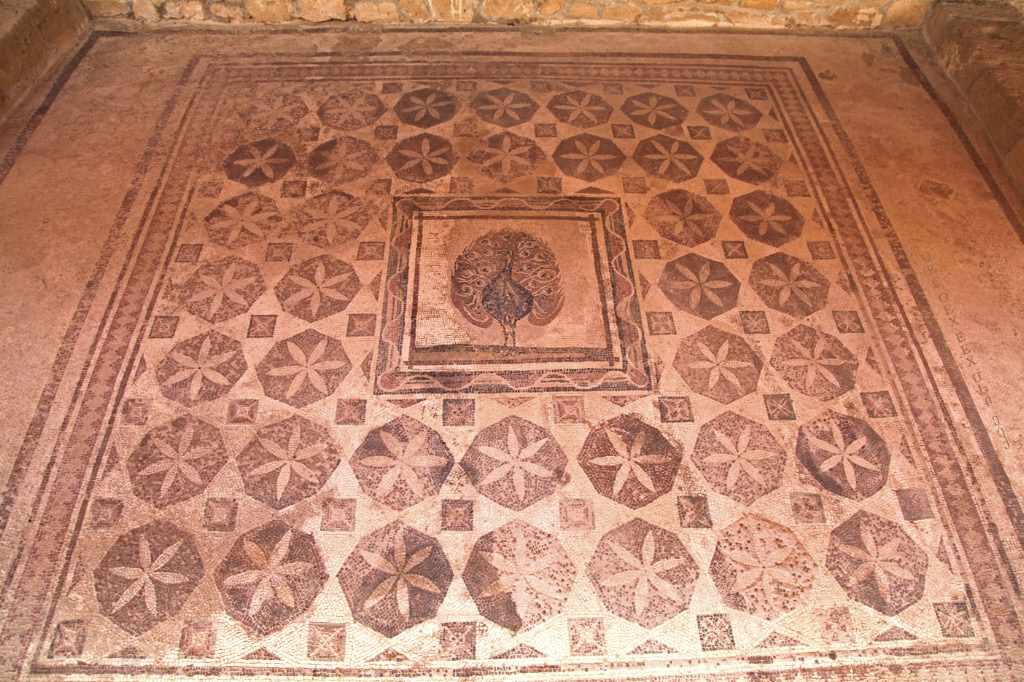 |
|
| |
... late Second- to early Third-Century floor mosaics from Dionysos Palace in Πάφος-Paphos, Cyprus |
|
| |
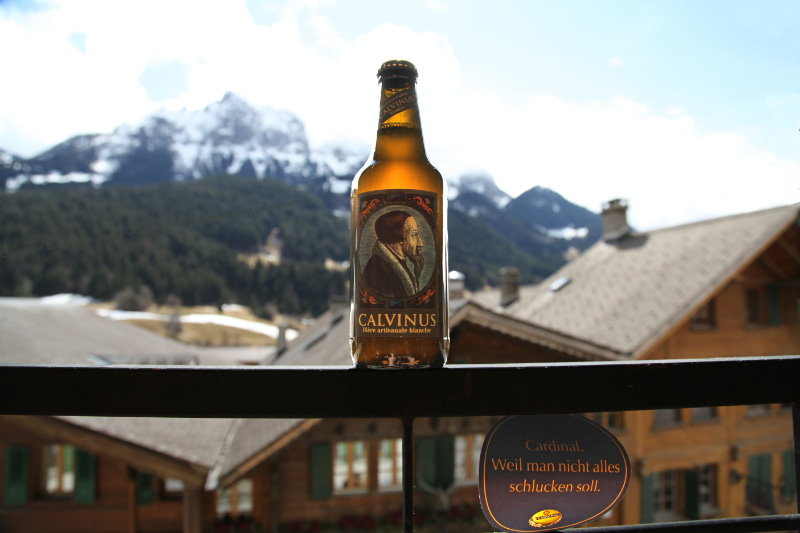 |
| |
|
Rougemont, Switzerland — Weil man nicht alles shlucken soll. |
|